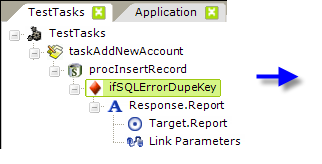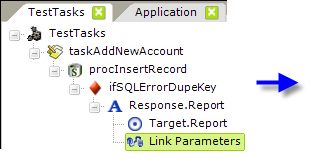Handle SQL Errors in Tasks
Logi Info developers can use Process definition Tasks to manipulate their database tables. This could generate SQL errors, so it's good to be able to handle generic and specific errors.
The following example assume that account names must be unique in the Accounts table.


In the Process definition shown above, a task has been added to add new accounts. It includes a Procedure.SQL element (procInsertRecord) which will insert the new account records. An If Error element has been added beneath it to handle any errors that occur, and to route processing back to a report definition.
To handle generic SQL errors, you can leave the If Error element's Error Filter attribute value blank and it will "catch" any error that occurs as a result of the SQL operation.
If you want to handle specific SQL errors, you can fill-in the Error Filter attribute with some of the text that the SQL server will return in an error message caused by a specific type of error. The example above suggests an error number and partial text from a duplicate primary key error message. If the text in the attribute value is contained in the server's error message, processing will be routed to the If Error element's child elements.
You can stack up more than one If Error element, for example, to first handle several different specific errors and then finally handle a generic error.


You can send the actual error message returned from the SQL server to the target report, as shown above.
A special token is used for the error message. It starts with "@Procedure.", then includes the ID of the Procedure.SQL element used, another dot, and finally the words "ErrorMessage". Don't forget the tilde character ("~") that terminates every token!
@Procedure.procInsertRecord.ErrorMessage~
This technique allows you to show your own "user friendly" error messages for specific SQL errors, while sending along the exact SQL error message for any other SQL errors.